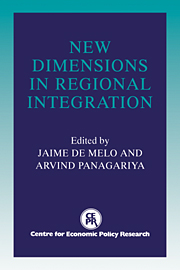Book contents
- Frontmatter
- Contents
- List of figures
- List of tables
- Preface
- Foreword
- Acknowledgements
- List of conference participants
- PART ONE SYSTEMIC ISSUES
- 1 Introduction
- 2 Regionalism and multilateralism: an overview
- Discussion
- 3 Regionalism versus multilateralism: analytical notes
- Discussion
- 4 Multilateral and bilateral trade policies in the world trading system: an historical perspective
- Discussion
- 5 GATT's influence on regional arrangements
- Discussion
- PART TWO COUNTRY ISSUES
- Index
5 - GATT's influence on regional arrangements
Published online by Cambridge University Press: 04 May 2010
- Frontmatter
- Contents
- List of figures
- List of tables
- Preface
- Foreword
- Acknowledgements
- List of conference participants
- PART ONE SYSTEMIC ISSUES
- 1 Introduction
- 2 Regionalism and multilateralism: an overview
- Discussion
- 3 Regionalism versus multilateralism: analytical notes
- Discussion
- 4 Multilateral and bilateral trade policies in the world trading system: an historical perspective
- Discussion
- 5 GATT's influence on regional arrangements
- Discussion
- PART TWO COUNTRY ISSUES
- Index
Summary
The World Bank, the International Monetary Fund (IMF), the Organisation for Economic Cooperation and Development (OECD), the General Agreement on Tariffs and Trade (GATT) – they are all in the same business. They try to influence, and sometimes do influence, national choices of policy. But no international organisation has sovereignty over any nation's policy. In the end, a nation's tariff or its import licensing requirement is what that country's government says it is.
Though regional arrangements are coming into fashion (perhaps more rapidly than into function), the GATT will remain the major global steward of commercial policy. Knowing how the GATT has nudged regional arrangements toward good international (multilateral) citizenship in the past is important in judging how it might continue to do so in the future.
But if we ask ‘What are the GATT rules about regional arrangements?’ we are asking at best only half the question. Equally (or more) important is how the GATT attempts to influence a national government to keep its trade policies in line with the objectives the GATT was created to advance – fewer and less discriminatory trade restrictions.
Section 1 looks at the historical origins of GATT's rules for regional arrangements and then at their substantive content. Sections 2–4 review GATT's experiences with regional arrangements. Section 5 presents some conclusions and policy applications. The key to understanding the lessons these experiences provide is to remember that GATT began as an exchange of market access concessions. Preserving and extending the value of that market access is still the motivating interest for GATT's member countries.
- Type
- Chapter
- Information
- New Dimensions in Regional Integration , pp. 128 - 148Publisher: Cambridge University PressPrint publication year: 1993
- 3
- Cited by



